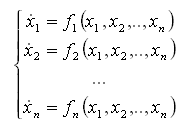GPoM* (Global Polynomial Modelling) is an ensemble of aglorithms developed in R language and gathered in a package which main objective is to obtain governing equations of compact form directly from observational time series. It can — in principle — be used with relatively small data sets of single or multiple time series.
Mangiarotti, S., Coudret, R., Drapeau, L., & Jarlan, L. (2012). Polynomial search and global modeling: Two algorithms for modeling chaos. Physical Review E, 86(4), 046205 [hal]
Contact : sylvain.mangiarotti@cesbio.cnes.fr
Its objective
This package is dedicated to multiple time series datasets but also applies to single time series. It is based on an algorithm aiming at identifying the models’ structures of Ordinary Differential Equations (ODE) in a polynomial formulation :

Retro-modelling
When all the variables of a studied system are observed, it can be expected to retrieve the original equations (in compact form) directly from the observational time series.
Mangiarotti S & Huc M (2019). Can the original equations of a dynamical system be retrieved from observational time series? Chaos: an Interdisciplinary Journal of Nonlinear Science, 29, 023133 [hal]
Applications
The tool could be applied to diversified applications:
- Cereal crops in semi-arid regions observed from satellite
- Crops classification
- The discharge of karst springs (Doubs and Lez, France)
- The dynamics of earthworms and its coupling to soil water content
- The modelling of micro-atmospheres (The cave of Altamira)
The package can be directly downloaded on the Comprehensive R Archive Network (CRAN) at the following link:
GPoM R package: Generalized Polynomial Modelling
*Notes: the first version of the package consisted in two main algorithms PoMoS (Polynomial Model Search) and GloMo (Global Modelling) which have been updated, rewritten and boosted in a single, more powerful, package.
